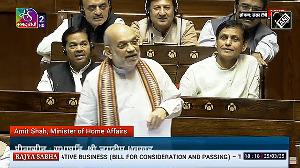The manipulative syntax of the bill smacks of a furtive agenda to tilt the scales in favour of a specific community at the cost of the majority and violates the basic tenet of equality before the law, says Vivek Gumaste.
Being charred to death in a train compartment transformed into a raging inferno by a violent, baying pyromanaical mob reeking with animosity would certainly codify one as a victim of communal violence by any lexicographic criterion (Godhra 2002). But not if you happen to be a Hindu, the majority community, you do not, according to the Prevention of Communal and Targeted Violence Bill, 2011.
As per the bill, a 'victim' is not a stand alone descriptor but includes a modifier of 'belonging to a group as defined under this Act'.
And a 'group' the bill stipulates is "a religious or linguistic minority, in any state in the Union of India, or Scheduled Castes and Scheduled Tribes within the meaning of clauses (24) and (25) of Article 366 of the Constitution of India."
This restrictive definition of victim hood with its deliberate and manipulative syntax smacks of a furtive agenda to tilt the scales in favor a specific community at the cost of the majority and violates the basic tenet of equality before the law.
Additionally by co-opting a minority status into the definition of victim hood, this bill makes the fallacious assumption that members of the majority are immune to sectarian violence and do not warrant specific legal intervention: a fantastic and unrealistic claim that jars with realty.
While an affirmative action type of approach maybe valid in countries with homogenous populations where the minority and majority communities fit into typical molds, such a proposition may not hold good for an overwhelmingly pluralistic India.
A diversity of manifold traits splashed against the backdrop of a contentious history with discordant power equations has created a complex land where a numerical majority does not automatically translate into functional advantage and security. Demographic logistics often reduce a so-called majority community into a minority and vice-versa making such labels meaningless.
For example, in pre-partition India, Hindus comprised 70 percent of the population making them numerically a majority. Yet this perceived advantage did not protect them from becoming the victims of what is arguably the worst communal fracas in the history of the subcontinent -- the massacre at Noakhali in 1946: over 5,000 Hindus were butchered, hundreds of women were raped and thousands more were forcibly converted to Islam.
Closer to recent times is the plight of the Kashmiri Hindus. Nearly a quarter million Kashmiri Hindus have been driven out of their homes permanently negating the hypothesis that a majority identity guarantees security.
The misfortune of the Kashmiri Hindus has failed to evoke the appropriate response that such a horrendous atrocity should elicit thanks to a warped mindset prevalent in certain sections of our society that consistently underplays atrocities committed against the majority community. It is this same twisted thought process that is the driving force behind this flawed bill.
The aphorism justice is blind is meant to emphasise the non-partisan nature of law. An ideal bill should endorse a uniform code of conduct that is universally applicable in the setting of communal conflict making no distinction between Hindu, Muslim, Sikh and Christian. The present draft, a complete anti-thesis of an ideal instrument, needs to be scrapped.
Finally the million dollar question: Do we need such a bill at all? Are additional stringent laws the answer or are we barking up the wrong tree?
Scholars postulate that paucity of adequate laws is not what fuels communal violence. Paul R Brass, Professor of Political Science and International Studies at the University of Washington, Seattle and Steven Wilkinson, Nilekani Professor of India and South Asian Studies, Yale University implicate political delinquency as the cardinal culprit.
In his book, The Production of Hindu-Muslim Violence in Contemporary India (University of Washington Press, 2000), Paul Brass concludes: "while there are demographic, economic, and caste/communal differences that distinguish the populations in such localities, it is political activity, organization and leadership that demarcate most clearly the riot-prone or riot-affected from the less affected localities."
Steven Wilkinson concurs with the concept of political complicity. In an article titled Communal Riots in India (Economic and Political Weekly. October 29, 2005) he remarks: "What causes communal riots in contemporary India? In my book Votes and Violence (2005), I argue that politicians both cause them and, more importantly, have the power to prevent them, through their control of the state governments responsible for law and order."
Furthermore in his book, Wilkinson specifically indicts the Congress Party which masquerades as the high priest of secular values: "at one time or another, Congress politicians have both fomented and prevented communal violence for political advantage. Congress governments have failed, for example, to prevent some of India's worst riots (e g, the Ahmedabad riots of 1969, the Moradabad riots of 1980, and the Meerut riots of 1987) and in some cases Congress ministers have reportedly instigated riots "
Ashutosh Varshney (Ethnic Confict and Civic Life, Yale University Press, 2003) is of the contention that forging bonds at the level of civil society could be the great game changer: "If vibrant organisations serving the economic, cultural, and social needs of the two communities exist, the support for communal peace not only tends to be strong but it can also be more solidly expressed."
The panacea for communal discord therefore lies in exacting accountability from our political leaders and championing efforts to bring one and all into the mainstream erasing suspicion and distrust that stems from parochial schools and segregated neighborhoods.








 © 2025
© 2025